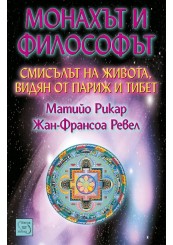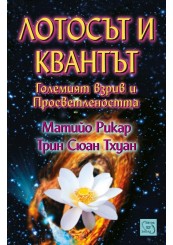Matthieu Ricard

Matthieu Ricard (born 15 February 1946) is a French writer and Buddhist monk who resides at Shechen Tennyi Dargyeling Monastery in Nepal.
Matthieu Ricard grew up among the personalities and ideas of French intellectual circles. He received a Ph.D. degree in molecular genetics from the Pasteur Institute in 1972. He then decided to forsake his scientific career and instead practice Tibetan Buddhism, living mainly in the Himalayas.
Ricard is a board member of the Mind and Life Institute and received the French National Order of Merit for his humanitarian work in the East.
Born in Aix-les-Bains, Savoie, France, he is the son of the late Jean-François Revel (born Jean-François Ricard), a renowned French philosopher. His mother is the lyrical abstractionist painter and Tibetan Buddhist nun Yahne Le Toumelin. Matthieu Ricard grew up among the personalities and ideas of French intellectual circles.
Ricard worked for a Ph.D. degree in molecular genetics at the Pasteur Institute under French Nobel Laureate François Jacob. After completing his doctoral thesis in 1972, Ricard decided to forsake his scientific career and concentrate on the practice of Tibetan Buddhism.
Ricard then went to India where he lived in the Himalayas studying with the Kangyur Rinpoche and some other great masters of that tradition. He became a close student and friend of Dilgo Khyentse Rinpoche until Rinpoche's death in 1991. Since then, Ricard has dedicated his activities to fulfilling Khyentse Rinpoche’s vision.
Ricard has been called the "happiest person in the world" by several popular media. Matthieu Ricard was a volunteer subject in a study performed at the University of Wisconsin–Madison on happiness, scoring significantly above the average of hundreds of volunteers.
He co-authored a study on the brains of long-term meditators, including himself, who had undergone a minimum of three years retreat.
Ricard is a board member of the Mind and Life Institute, which is devoted to meetings and collaborative research between scientists and Buddhist scholars and meditators, his contributions have appeared in Destructive Emotions (edited by Daniel Goleman) and other books of essays. He is engaged in research on the effect of mind training on the brain, at Madison-Wisconsin, Princeton and Berkeley.
€18.40 (36.00 лв.) €23.01 (45.00 лв.) Ex Tax: €16.88 (33.02 лв.)
€5.32 (10.40 лв.) €6.65 (13.00 лв.) Ex Tax: €4.88 (9.54 лв.)
€6.96 (13.60 лв.) €8.69 (17.00 лв.) Ex Tax: €6.38 (12.48 лв.)
€6.55 (12.80 лв.) €8.18 (16.00 лв.) Ex Tax: €6.00 (11.74 лв.)
€5.72 (11.20 лв.) €7.16 (14.00 лв.) Ex Tax: €5.25 (10.27 лв.)






